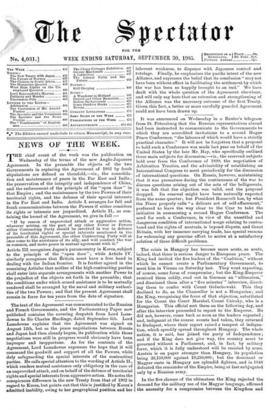It was announced on Wednesday in a Renter's telegram from
St. Petersburg that the Russian representatives abroad bad been instructed to communicate to the Governments to which they are accredited invitations to a second Hague Peace Conference, "the labours of which would have a strictly practical character." It will not be forgotten that a proposal to hold such a Conference was made last year on behalf of the United States by the late Mr. Hay, who specifically outlined three main subjects for discussion,—viz., the reserved subjects held over from the Conference of 1899, the negotiation of Arbitration Treaties, and the advisability of establishing an International Congress to meet periodically for the discussion of international questions. On Russia, however, maintaining that it was premature during the continuance of the war to discuss questions arising out of the acts of the belligerents, it was felt that the objection was valid, and the proposal dropped. Its renewal might have been naturally expected from the same quarter; but President Roosevelt has, by what the Times properly calls "a delicate act of self-effacement," preferred to leave the way clear to the Czar to take the initiative in summoning a second Hague Conference. The need for such a Conference, in view of the unsettled and dangerous condition of international usage relating to contra- band and the rights of neutrals, is beyond dispute, and Great Britain, with her immense carrying trade, has special reasons for welcoming any genuine effort to arrive at a satisfactory solution of these difficult problems.










































